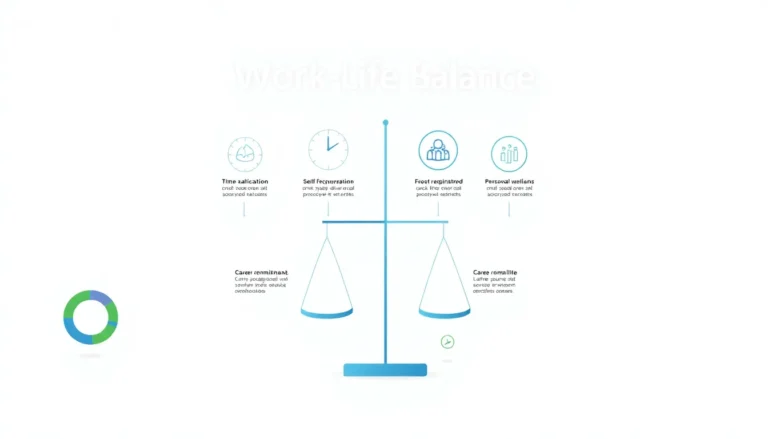Table of Contents
ToggleIn a world that often feels like a circus act, juggling work, family, and personal time can leave anyone feeling like they’re one misstep away from a spectacular faceplant. But fear not! Balance isn’t just a mythical creature; it’s a skill anyone can master with the right advice.
Imagine strutting through life like a tightrope walker, gracefully navigating the highs and lows without losing your lunch—or your sanity. This article dives into practical balance advice that’ll help anyone find their footing. From time management hacks to self-care tips, it’s time to reclaim that elusive equilibrium. Get ready to laugh, learn, and maybe even discover that balance isn’t so hard after all.
Understanding Balance Advice
Balance advice provides insights into managing various aspects of life effectively. Individuals can learn practical strategies for achieving equilibrium in their daily routines.
Definition of Balance Advice
Balance advice refers to guidance aimed at helping individuals manage their time and responsibilities. It encompasses techniques for prioritizing tasks while maintaining physical and emotional well-being. With the right approach, people can create harmony between work demands, family obligations, and personal pursuits. Emphasis lies on practical solutions that promote a fulfilling lifestyle.
Importance of Balance in Daily Life
Balance plays a crucial role in daily life. Effective time management enhances productivity and reduces stress. When individuals prioritize better, they experience increased focus, leading to improved performance in various areas. Furthermore, a balanced life fosters healthier relationships and personal satisfaction. Overall, integrating balance into daily routines supports long-term health and emotional stability.
Types of Balance Advice

Various forms of balance advice help individuals navigate their complex lives. Each type addresses specific areas of balance, from physical well-being to emotional health and financial stability.
Physical Balance Advice
Physical balance advice focuses on maintaining a healthy body. Engaging in regular exercise supports overall health. Incorporating activities like yoga or Pilates enhances core strength and flexibility. Nutrition plays a key role, too; consuming balanced meals aids energy levels. Proper sleep hygiene improves physical resilience and cognitive function. Setting realistic fitness goals encourages consistency. By prioritizing these aspects, individuals can establish a strong foundation for physical well-being.
Emotional Balance Advice
Emotional balance advice aids in managing mental health effectively. Practicing mindfulness techniques, such as meditation, fosters emotional awareness. Building supportive relationships offers necessary social connections. Expressing feelings through journaling helps with emotional processing. Identifying triggers allows for better emotional regulation. Taking breaks during stressful situations promotes mental clarity. Engaging in hobbies provides joy and relaxation. By focusing on emotional balance, individuals enhance their overall well-being and resilience.
Financial Balance Advice
Financial balance advice empowers individuals to manage their resources wisely. Creating a budget allows for better tracking of income and expenses. Setting savings goals promotes financial security in the long run. Understanding debt management aids in maintaining credit health. Investing in education can lead to improved job opportunities. Seeking professional financial advice can clarify investment strategies. By prioritizing financial literacy, individuals can achieve stability and peace of mind.
Techniques for Implementing Balance Advice
Incorporating balance advice into daily routines enhances overall well-being. Practical techniques exist for applying this guidance effectively.
Mindfulness Practices
Mindfulness practices foster emotional balance. Techniques like deep breathing and meditation ground individuals in the present. Individuals often find that daily mindfulness routines reduce anxiety and promote clarity. Engaging in mindful activities, such as yoga or journaling, also cultivates self-awareness. Observing thoughts without judgment empowers a healthier mental state. Establishing a routine can enhance consistency in practicing mindfulness.
Time Management Strategies
Effective time management strategies yield improved productivity. Prioritizing tasks based on urgency and importance allows individuals to focus on what matters most. Utilizing tools like calendars and to-do lists helps visualize obligations. Block scheduling can prevent overcommitting and ensure time for personal pursuits. Individuals often benefit from setting realistic deadlines to enhance accountability. Reviewing weekly accomplishments allows for better planning next week.
Financial Planning Tips
Financial planning tips help maintain financial balance. Creating a realistic budget enables clear tracking of income and expenses. Setting specific saving goals motivates individuals to achieve financial targets. Seeking professional advice offers insights into investment options and risk management. Regularly reviewing financial progress informs necessary adjustments. Individuals often find that automating savings helps build financial security over time. Prioritization of spending according to values leads to enhanced satisfaction.
Benefits of Following Balance Advice
Embracing balance advice leads to multiple advantages that enrich various life aspects.
Improved Well-Being
Enhanced physical and emotional health emerges from following expert recommendations on balance. Regular exercise strengthens the body, while nutritious food supports immune function. Utilizing mindfulness practices fosters mental clarity and emotional resilience. Prioritizing self-care encourages individuals to recharge and engage in activities they enjoy. When stress levels decrease and happiness increases, overall well-being flourishes.
Enhanced Productivity
Boosted productivity results when individuals implement balance advice effectively. Prioritization techniques enable better task management, allowing individuals to focus on what truly matters. People who establish structured schedules find themselves completing work more efficiently. Utilizing digital tools can streamline workflows, reducing time spent on mundane tasks. With improved time distribution, stress diminishes while results in both personal and professional realms improve.
Better Financial Health
Sound financial advice cultivates better management of resources. Creating budgets ensures individuals track spending and align priorities with financial goals. Setting realistic savings targets helps accumulate funds for emergencies or future purchases. Seeking professional financial guidance provides insights into investment strategies. When spending and saving become more balanced, overall financial health strengthens, providing security in uncertain times.
Finding balance in life is an ongoing journey that requires commitment and adaptability. By integrating the practical strategies discussed, individuals can cultivate a harmonious existence that nurtures both personal and professional growth. Embracing balance advice not only enhances overall well-being but also empowers individuals to tackle life’s challenges with confidence.
As they implement these techniques, they’ll likely discover newfound resilience and clarity in their daily routines. The pursuit of balance is not just about managing time but fostering a fulfilling life that reflects their values and aspirations. With dedication and the right mindset, achieving balance becomes a rewarding reality.







